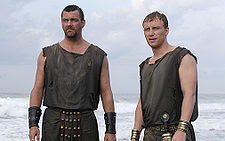On "Rome"
The HBO series «Rome» magnificently recreates the feted accomplishments and the much dissected feuds of what was the precursor to the Roman Empire: the not so tranquil Roman republic. But what it does even better, is portraying the ghastly depravities and shockingly inhuman practices that marked life in whatever walk of life you could think of.
Critics, both scholars and others well versed in all things Roman, have praised the televised efforts of HBO. According to some, «Rome» is probably peerless it managing, far removed in time and place from the actual events and people, to present to the postmodern viewer the gritty squalor of urban congestion, while simultaneously unmasking the alleged refinery and sophistication of the upper classes.
Age of conflict
«Rome» brings to life the tumultuous period between the fall of the ancient republic and the ascendancy of the premier representative of some of the most lustrious power-grabbers of all time: Gaius Julius Ceasar, or Octavian, later known as Augustus, the first of Roman emperors. As is the case with Octavian, most of the major characters in «Rome» are historic, but to avoid making this yet another attempt at depicting the all too well known life of the privileged classes, quite a number of fictional characters from the lower rungs of society have been added.
Combined, this makes for a visualized recreation of the complete catalogue of possible human sins, barring none.
Because whether top-rung or lowlife, nobility or gutter-born slave, throughout the series the Atias and Pullos of Rome stunningly display, with uncanny knack, the basest of instincts and thoroughly corrupted emotions. And they do it, as it were, with such insiduous persistence that, in the end, it's virtually impossible to the 21st century viewer not to protest the almost subservient, drooling admiration previously voiced by either Academia or the staunch defenders of refined culture.
Creators and achievers
Yes, Rome and its empire builders certainly made it in terms of successfully creating and sustaining a vast, unified and, yet, ethnically and culturally diverse political and military domain that lasted an amazing four hundred years. Admittedly, the progeny of Octavian oversaw the erection of marble and other structures, such as the Colosseum in Rome, that continue to excite and baffle tourists. And granted, Romans weren't merely a group of villains and thugs. The users of the Latin language adored, collected and perpetuated some of Western civilization's finest works of art and. And finally, without question, these sometime callous killers also had among them masters of oratory and literature.
So why am I not a wholehearted fan of this ancient, iconic superpower and all that it stood for?
Not worse than most, but bad enough
In a society that lacked absolutely any kind of law enforcement bodies, life was a precarious thing. The vast majority of people, having no political clout at all – and no say in how state affairs were to be run, had to depend on protection from some kind of wealthy or influential benefactor. In the stinking alleys and gutters of the Subura, you were easy prey – always – travelling alone with no bodyguard or ironfisted slave to scout for possible danger.
And if bad luck came along, there was little consolation to be gleaned from the fact that justice was always on the side of the more powerful. Commoners could not afford a lawyer to aid them in court, and there would be no courts in session either when the farmer's daughter was raped, or when the senator's private ambissions meant that small flat you rented would be demolished, and you once again had to seek shelter from the rain and wind – with no other place to go.
The few reveled on the backs of the many
Roman civilization depended heavily on its military prowess in order to survive or expand. Much like modern-day China, its almost ubiqutous army was ever on the ready to frustrate the possible success of any major uprising or internal unrest, wherever in the empire it might surface. And so, backed by the terrifying power of the spears and swords, the elite in Rome were able to peacefully ply their trades, unscrupulously creating fortunes on the sweat pouring down the brows of their slaves, the backbone of their success.
Slaves were a staple feature of life in Rome and elsewhere within its borders, constituting two thirds of the entire population of their domain. Slaves were items to be owned, bought and sold at will, enjoying no civil liberties or civil rights. The old among them were cheaper than household pets, if you considered purchasing one at the market. A few were e.g. trusted advisors to their masters, but most toiled from dawn to dusk – being little more than fuel on the fire their overlords could warm themselves by.
Unrestrained emotions and ambitions
In «Rome», most of the protagonists share the uncanny characteristic that in a moment of personal danger, or possible personal success, they will go to any length to safeguard or secure their own status or desired objective. The Marc Anthony's or Octavian's of the then Rome answered to no one except their tribal or family heads, and when finally crowned with the ultimate influence, they would unleash their pent-up fury or unrestrained ambitions on anyone, ally or adversary. This was the heyday of political murders - and the point in history in which political intrigue evolved into some kind of perfid art form.
Romans loved passionately, conspired atrociously, abused gleefully, punished savagely and ultimately saw to it that their long-lasting empire imploded ingloriously after centuries of uninhibited living. The giant collapsed, not so much because of external factors as because of internal decay: the great Roma tired in the end of its carnal pursuits. Fatigue and the price of overambition finished what previous kings and pretenders had tried to accomplish.
Watching «Rome» has brought me a hightened sense of gratitude for the civility and compassion that modern Norway accords its own citizens. And it has helped me understand how the gospel of Jesus could make such astounding progress in an empire of some 60 million people.



Kommentarer
Legg inn en kommentar